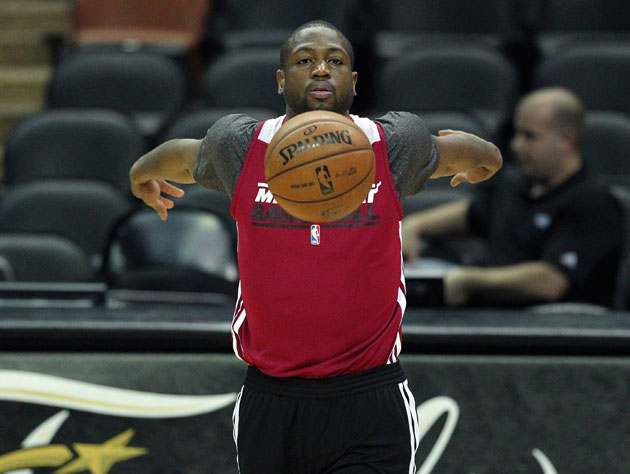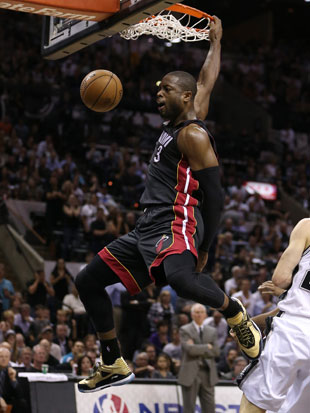
We’ve been down this path before. Dwyane Wade’s All-Star-level play is crucially important to the Miami Heat. When he cuts and slashes with ease like he did in Thursday’s 32-point outing in Game 4, scoring in the lane and disrupting the passing lanes on defense, Miami is just about unbeatable. When he misses on runners, bricks his jumpers, and looks a step-slow on the other end of the court? The Heat are quite vulnerable. This has been obvious to any set of eyes during the last two postseasons.
Thanks to Chris Herring of the Wall St. Journal, though, we now have a qualification of how much Dwyane’s regular season-typical 20 points per game help the Heat out. Wade, who turned into “Flash” in Thursday’s Game 4 despite a nagging knee injury, may just be the biggest X-factor in NBA playoffs history.
The Heat have won 42 of the 46 games this season in which Wade scored 20 points or more.
According to Stats LLC, only four players in the past 25 seasons have logged better winning percentages in such scenarios: Chicago's Scottie Pippen (1996), Detroit's Joe Dumars (1989 and 1990), San Antonio's Tony Parker (2003) and Boston's Robert Parish (1986). Each of those men won NBA titles in those years.
Context is crucial, and telling in this instance.
Pippen battled a heel and back injury throughout 1995-96, and while he remained perhaps the league’s best defender, his scoring acumen (especially in the playoffs) suffered. Joe Dumars was an All-Star guard during Detroit’s two title runs, but the 1989 NBA Finals MVP was working on a team thick with contributors who needed the ball. Tony Parker, in his second season during 2002-03, was a wildly inconsistent performer with much to learn, and Robert Parish’s offensive contributions in 1985-86 were out and out gravy for the best Boston Celtic team of the Larry Bird era.
The most direct comparison can be made to Pippen. Wade and Scottie serve two completely different roles defensively (Pippen was not a roamer by habit, and you’d never catch his head turned on that end), but they both worked as clear Number Twos to the best player of that particular era. They were also the second scoring option on top-heavy teams full of role players, because while the 1995-96 Chicago Bulls won an NBA record 72 games during that season, the team really only had three players (Pippen, Michael Jordan, and Toni Kukoc) that could create their own shots.
This year’s Heat also ran down a significant milestone, winning a remarkable 27 games in a row during the regular season, and they’re not to be dismissed just because they’ve split the first four with a championship-caliber San Antonio Spurs team during this year’s Finals. They still are just as top-heavy as those Bulls, and a significant chunk of that top has fallen off quite a bit since the postseason started. In his piece, Herring details just how far Wade has dropped since the playoff decals hit the floor:
Wade entered Game 4 averaging just 14 points per game, a seven-point drop from his regular-season average. That wasn't just a small concern, it was a historic one: If it held through the end of the playoffs, and the Heat win anyway, it would mark the steepest fall for a second-leading scorer on a title-winning team in NBA history.
The Heat should “win anyway.” The Spurs are a fantastic team with a brilliant coaching staff leading the way, and the odds are pointing toward San Antonio taking Game 5 in their final home performance in a remarkable season. This is still a best-of three series with two to be possibly played in Miami, though, and the Heat earned that advantage with a marvelous regular season. And in what has been somewhat under-reported, the defending champs have worked through a remarkably strange postseason – facing a sub-mediocre Milwaukee Bucks squad before taking on an odd, shape-shifting Chicago Bulls team just before hitting up a batch of Indiana Pacers that still have quite a lot to figure out.
Then there’s the Spurs, who seem to change rotations and outlooks daily, a team that started Game 4 by guarding Wade with Tiago Splitter, the ultimate diss sent the way of a player that had been the go-to first quarter offensive focus for Miami for the previous couple of games.
 It wasn’t just Wade that reacted to that batch of disrespect with improved shooting and increased efficiency. San Antonio could have put all-world defender Kawhi Leonard on Dwyane to start, and it may not have mattered – Miami’s game plan was just as big a factor in Wade’s Game 4 revival as anything else. The Heat put their shooting guard in parts of the court that acted as his comfort zone, as the runners that rimmed out in the previous game were now being launched from familiar parts of the paint. It’s true that Wade had good looks in Game 3, but they weren’t looks he was used to. The Heat went out of their way to change that in Game 4.
It wasn’t just Wade that reacted to that batch of disrespect with improved shooting and increased efficiency. San Antonio could have put all-world defender Kawhi Leonard on Dwyane to start, and it may not have mattered – Miami’s game plan was just as big a factor in Wade’s Game 4 revival as anything else. The Heat put their shooting guard in parts of the court that acted as his comfort zone, as the runners that rimmed out in the previous game were now being launched from familiar parts of the paint. It’s true that Wade had good looks in Game 3, but they weren’t looks he was used to. The Heat went out of their way to change that in Game 4.
San Antonio was aware of this by the time garbage time hit in Game 4, and you know they’ve had a counter in place since their heads hit the pillows in the wee hours on Friday morning. Wade and the Heat are no doubt aware of the San Antonio reaction, and they’ve had a counter to that counter in mind since around the same time.
So what makes the bigger dent? The smart and precise unstoppable force or the intelligent and anticipatory immovable object? Well, that’s what makes these NBA Finals so damn interesting.
One thing we do know? Dude’s gotta score 20 points. Dwyane Wade has to find a way to get his, once again.
No comments:
Post a Comment